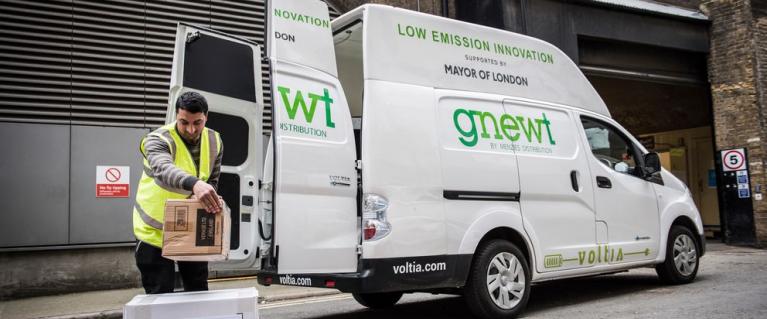
Electric delivery vehicle trial
Part of the Mayor of London’s plans to cut air pollution is to work with freight companies, reducing the number of lorries on London’s roads. Commercial freight vehicles represent 30 per cent of all central London traffic, making an estimated 281,000 journeys per day.
To address this, the Mayor teamed up with Gnewt on a project to test electric delivery van performance in central London, without adversely contributing to air pollution. Gnewt is an established electric delivery specialist operating last mile deliveries. This two and a half year trial (finishing end December 2019) tested a set of innovative new vans, which will be added to Gnewt's existing fully electric vehicle fleet. The trial vans' emission performance was tested against comparable diesel delivery vans, using smart Fleet Carma telemetry technology.
Arup provided data analysis and reporting throughout the project.
The trial was part of the Low Emission Freight and Logistics trial funded by the Office for Low Emission Vehicles (OLEV) in partnership with Innovate UK.
The trial was also supported by LoCITY, a programme led by TfL that brings together freight operators, vehicle manufacturers, fuel providers and the public sector to stimulate uptake in low emission commercial vehicles.
Playing this video will set cookies from YouTube/Google
About the vans
These state-of-art vehicles, comprising of the Voltia (Nissan) and BD Auto (e-Ducato) were specially designed for this project. They are larger than most light goods vehicles, with an expanded capacity meaning fewer vehicles are needed for deliveries, causing less congestion on London’s roads.
How were they charged?
The project included installing and testing EO smart charge points at the van storage depot. This charging technology meant charging vehicles at the most suitable time of day (minimising grid impact). The trial has helped both Gnewt and the Mayor understand the additional grid demand created by electric vehicles, while assessing potential for reverse vehicle to grid charging.
How did we measure performance?
The trial measured both comparable diesel vans as well as these new electric vehicles - all of which were fitted with SMART Fleet Carma telemetry hardware to remotely monitor environmental emissions performance, electric vehicle range, electrical energy consumed and more.
Trial data and reporting is available on our Datastore.
- The trial electric vans, with their larger payload volumes, delivered on average 30 per cent more parcels per week compared to the smaller vehicles – helping to reduce congestion by making fewer trips
- The overall electricity cost for charging up the trial vans was 75 per cent less than the fuel costs to run their diesel equivalents (2019 costs)
- Socio-environmental benefits associated with electric vans replacing diesel equivalents (including cutting greenhouse gas emissions) equate to an estimated 1.8p to 2.6p benefit, per km driven, to Greater London
- The trial Voltia and Vic-Young electric vans used five times less energy per km than their diesel equivalents.
- Smart charging has reduced the grid connection size (kVA capacity) needed to accommodate the trial Gnewt Cargo fleet by over 100 per cent and the use of smart charging reduces the grid and operational charges associated with the trial electric van fleet
- Total emissions savings for the completed trial (trial vans only) between November 2017 and end September 2019 are as follows:
- PM10 – 1,136.8g
- NOx – 481.3 kg
- CO2 – 77.9 t (the equivalent to 142 return trips by road using a diesel Nissan NV200 van from Lands End to John O’Groats)
Read the full report on the Datastore.